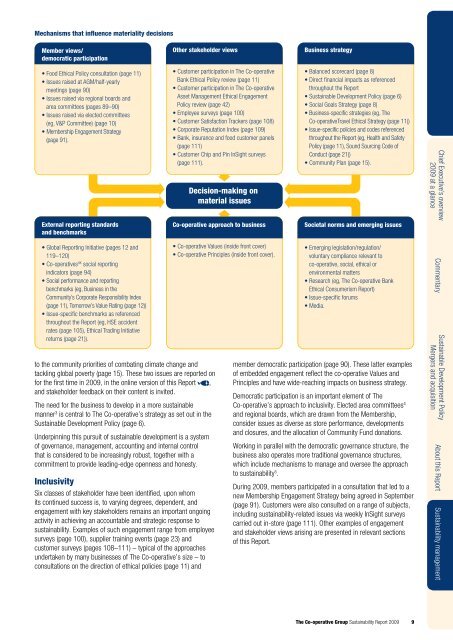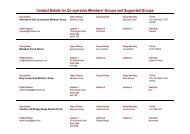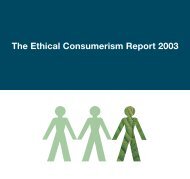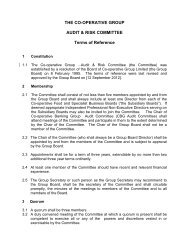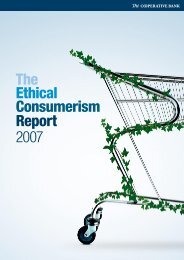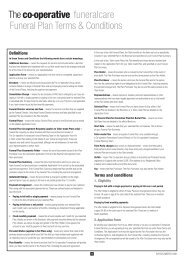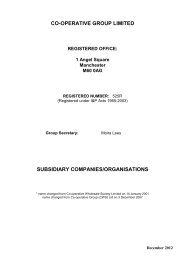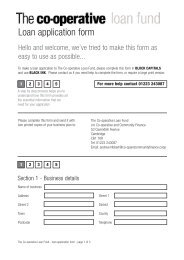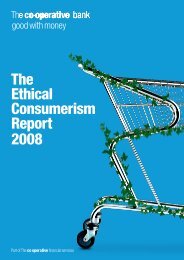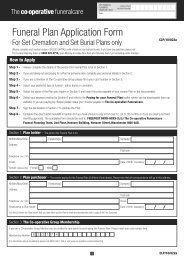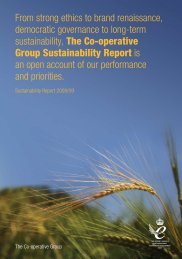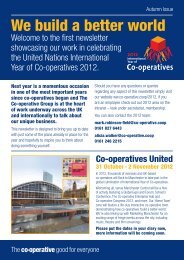Sustainability Report 2009 - The Co-operative
Sustainability Report 2009 - The Co-operative
Sustainability Report 2009 - The Co-operative
You also want an ePaper? Increase the reach of your titles
YUMPU automatically turns print PDFs into web optimized ePapers that Google loves.
Mechanisms that influence materiality decisions<br />
Member views/<br />
democratic participation<br />
Other stakeholder views<br />
Business strategy<br />
• Food Ethical Policy consultation (page 11)<br />
• Issues raised at AGM/half-yearly<br />
meetings (page 90)<br />
• Issues raised via regional boards and<br />
area committees (pages 89–90)<br />
• Issues raised via elected committees<br />
(eg, V&P <strong>Co</strong>mmittee) (page 10)<br />
• Membership Engagement Strategy<br />
(page 91).<br />
External reporting standards<br />
and benchmarks<br />
• Customer participation in <strong>The</strong> <strong>Co</strong>-<strong>operative</strong><br />
Bank Ethical Policy review (page 11)<br />
• Customer participation in <strong>The</strong> <strong>Co</strong>-<strong>operative</strong><br />
Asset Management Ethical Engagement<br />
Policy review (page 42)<br />
• Employee surveys (page 100)<br />
• Customer Satisfaction Trackers (page 108)<br />
• <strong>Co</strong>rporate Reputation Index (page 109)<br />
• Bank, insurance and food customer panels<br />
(page 111)<br />
• Customer Chip and Pin InSight surveys<br />
(page 111).<br />
Decision-making on<br />
material issues<br />
<strong>Co</strong>-<strong>operative</strong> approach to business<br />
• Balanced scorecard (page 8)<br />
• Direct financial impacts as referenced<br />
throughout the <strong>Report</strong><br />
• Sustainable Development Policy (page 6)<br />
• Social Goals Strategy (page 8)<br />
• Business-specific strategies (eg, <strong>The</strong><br />
<strong>Co</strong>-<strong>operative</strong>Travel Ethical Strategy (page 11))<br />
• Issue-specific policies and codes referenced<br />
throughout the <strong>Report</strong> (eg, Health and Safety<br />
Policy (page 11), Sound Sourcing <strong>Co</strong>de of<br />
<strong>Co</strong>nduct (page 21))<br />
• <strong>Co</strong>mmunity Plan (page 15).<br />
Societal norms and emerging issues<br />
Chief Executive’s overview<br />
<strong>2009</strong> at a glance<br />
• Global <strong>Report</strong>ing Initiative (pages 12 and<br />
119–120)<br />
• <strong>Co</strong>-<strong>operative</strong>s UK social reporting<br />
indicators (page 94)<br />
• Social performance and reporting<br />
benchmarks (eg, Business in the<br />
<strong>Co</strong>mmunity’s <strong>Co</strong>rporate Responsibility Index<br />
(page 11), Tomorrow’s Value Rating (page 12))<br />
• Issue-specific benchmarks as referenced<br />
throughout the <strong>Report</strong> (eg, HSE accident<br />
rates (page 105), Ethical Trading Initiative<br />
returns (page 21)).<br />
to the community priorities of combating climate change and<br />
tackling global poverty (page 15). <strong>The</strong>se two issues are reported on<br />
for the first time in <strong>2009</strong>, in the online version of this <strong>Report</strong> ,<br />
and stakeholder feedback on their content is invited.<br />
<strong>The</strong> need for the business to develop in a more sustainable<br />
manner 3 is central to <strong>The</strong> <strong>Co</strong>-<strong>operative</strong>’s strategy as set out in the<br />
Sustainable Development Policy (page 6).<br />
Underpinning this pursuit of sustainable development is a system<br />
of governance, management, accounting and internal control<br />
that is considered to be increasingly robust, together with a<br />
commitment to provide leading-edge openness and honesty.<br />
Inclusivity<br />
Six classes of stakeholder have been identified, upon whom<br />
its continued success is, to varying degrees, dependent, and<br />
engagement with key stakeholders remains an important ongoing<br />
activity in achieving an accountable and strategic response to<br />
sustainability. Examples of such engagement range from employee<br />
surveys (page 100), supplier training events (page 23) and<br />
customer surveys (pages 108–111) – typical of the approaches<br />
undertaken by many businesses of <strong>The</strong> <strong>Co</strong>-<strong>operative</strong>’s size – to<br />
consultations on the direction of ethical policies (page 11) and<br />
• <strong>Co</strong>-<strong>operative</strong> Values (inside front cover)<br />
• <strong>Co</strong>-<strong>operative</strong> Principles (inside front cover).<br />
• Emerging legislation/regulation/<br />
voluntary compliance relevant to<br />
co-<strong>operative</strong>, social, ethical or<br />
environmental matters<br />
• Research (eg, <strong>The</strong> <strong>Co</strong>-<strong>operative</strong> Bank<br />
Ethical <strong>Co</strong>nsumerism <strong>Report</strong>)<br />
• Issue-specific forums<br />
• Media.<br />
member democratic participation (page 90). <strong>The</strong>se latter examples<br />
of embedded engagement reflect the co-<strong>operative</strong> Values and<br />
Principles and have wide-reaching impacts on business strategy.<br />
Democratic participation is an important element of <strong>The</strong><br />
<strong>Co</strong>-<strong>operative</strong>’s approach to inclusivity. Elected area committees 4<br />
and regional boards, which are drawn from the Membership,<br />
consider issues as diverse as store performance, developments<br />
and closures, and the allocation of <strong>Co</strong>mmunity Fund donations.<br />
Working in parallel with the democratic governance structure, the<br />
business also operates more traditional governance structures,<br />
which include mechanisms to manage and oversee the approach<br />
to sustainability 5 .<br />
During <strong>2009</strong>, members participated in a consultation that led to a<br />
new Membership Engagement Strategy being agreed in September<br />
(page 91). Customers were also consulted on a range of subjects,<br />
including sustainability-related issues via weekly InSight surveys<br />
carried out in-store (page 111). Other examples of engagement<br />
and stakeholder views arising are presented in relevant sections<br />
of this <strong>Report</strong>.<br />
<strong>Co</strong>mmentary<br />
Sustainable Development Policy<br />
Mergers and acquisition<br />
About this <strong>Report</strong> <strong>Sustainability</strong> management<br />
<strong>The</strong> <strong>Co</strong>-<strong>operative</strong> Group <strong>Sustainability</strong> <strong>Report</strong> <strong>2009</strong> 9


